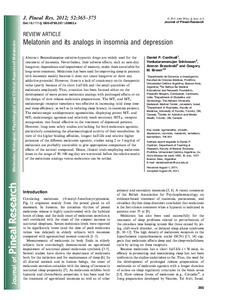Please use this identifier to cite or link to this item:
https://repositorio.uca.edu.ar/handle/123456789/1636| Título: | Melatonin and its analogs in insomnia and depression | Autor: | Cardinali, Daniel Pedro Srinivasan, Venkataramanujan Brzezinski, Amnon Brown, Gregory M. |
Palabras clave: | MELATONINA; INSOMNIO; DEPRESION; RAMELTEON | Fecha de publicación: | 2012 | Cita: | Cardinali, D. P., et al. Melatonin and its analogs insomnia and depression [en línea]. Journal of Pineal Research. 2012, 52 (4). doi:10.1111/j.1600-079X.2011.00962.x. Disponible en: https://repositorio.uca.edu.ar/handle/123456789/1636 | Resumen: | Abstract: Benzodiazepine sedative hypnotic drugs are widely used for treatment of insomnia. Nevertheless, their adverse effects, such as next-day hangover, dependence and impairment of memory, make them unsuitable for long term treatment. Melatonin has been used for improving sleep in patients with insomnia mainly because it does not cause hangover or show any addictive potential. However, there is a lack of consistency on its therapeutic value (partly due to its short half life and the small quantities of melatonin employed). Thus, attention has been focused either on the development of more potent melatonin analogues with prolonged effects or on the design of slow release melatonin preparations. The MT1 and MT2 melatonergic receptor ramelteon was effective in increasing total sleep time and sleep efficiency, as well as in reducing sleep latency, in insomnia patients. The melatonergic antidepressant agomelatine, displaying potent MT1 and MT2 melatonergic agonism and relatively weak serotonin 5HT2C receptor antagonism, was found effective in the treatment of depressed patients. However, long-term safety studies are lacking for both melatonin agonists, particularly considering the pharmacological activity of their metabolites. In view of the higher binding affinities, longest half-life and relative higher potencies of the different melatonin agonists, studies using 2 or 3 mg/day of melatonin are probably unsuitable to give appropriate comparison of the effects of the natural compound. Hence clinical trials employing melatonin doses in the range of 50- 100 mg/day are warranted before the relative merits of the melatonin analogs vs. melatonin can be settled. | URI: | https://repositorio.uca.edu.ar/handle/123456789/1636 | ISSN: | 1600-079X | Disciplina: | MEDICINA | DOI: | 10.1111/j.1600-079X.2011.00962.x | Derechos: | Acceso Abierto | Fuente: | Journal of Pineal Research. 2012, 52 (4) |
| Appears in Collections: | Artículos |
Files in This Item:
| File | Description | Size | Format | |
|---|---|---|---|---|
| melatonin-analogs-insomnia-depression-cardinali.pdf | 182,6 kB | Adobe PDF |  View/Open |
Page view(s)
382
checked on Apr 30, 2024
Download(s)
975
checked on Apr 30, 2024
Google ScholarTM
Check
Altmetric
Altmetric
This item is licensed under a Creative Commons License

